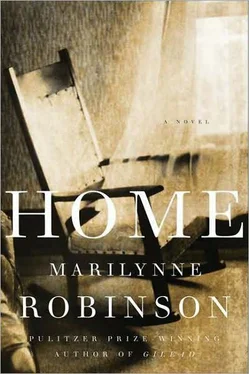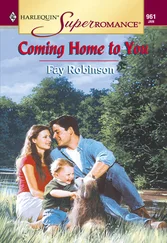Her brother leaned out of the candlelight while she served. He pushed back his hair and settled his tie down the front of his shirt, and then folded his hands in his lap, as if remembering to keep them out of sight. His father glanced at him from time to time, sidelong. Glory cut up her father’s toast, and then they ate in silence, except when Glory asked if they would like more of anything. She hadn’t read a newspaper in days or turned on the television set or the radio, so she could not think of a way to bring up Eisenhower or Dulles or baseball or Egypt, the things that focused her father’s attention, lured him out of his dreams. At least he and Jack were eating.
Finally, Jack cleared his throat. Still, his voice was a throaty whisper. “Sir,” he said, “there are some things I’ve wanted to say to you. If this is a good time. I thought it might be as good as any.”
His father smiled at him kindly. “No need to be so formal. I have been retired for a number of years. Just call me Robert.”
Jack looked at her.
She said, “Papa, can I get you some coffee?”
“Not for me, thanks. Our friend might want some.”
After a moment Jack said, “If I could talk to you about something. I wanted to tell you that after considerable reflection, after giving the matter some careful thought—” He looked at Glory and smiled.
His father nodded. “Are you considering the ministry?”
Jack took a deep breath and rubbed his eyes. “No, sir.”
“There’s quite a return to the ministry these days. Many young men are drawn to it now. It’s wonderful. You might want to think about it.”
Jack said, “Yes, sir.” He toyed with his water glass, reflecting. Then, “I’ve made an effort, for a number of reasons. To believe in something. I’ve read the Bible I don’t know how many times. And I’ve thought about it. Of course I have been in situations where it’s the only book they let you have, where there isn’t much else to think about. That you’d want to think about.” He looked at Glory. “I have tried, though. Maybe that just makes me — obdurate. Isn’t that the word? I don’t know why I am what I am. I’d have been like you if I could.”
His father looked at him, solemnly uncomprehending.
Jack said, “I meant to tell you that I had — after careful thought, I had become persuaded of the truth of Scripture. Teddy said it would be all right to say that. I wanted you to stop worrying about me. But all I can really say is that I’ve tried to understand. And I did try to live a better life. I don’t know what I’ll do now. But I did try.”
The old man looked at him intently. Then he said, “That’s fine, dear. Have we talked before? I don’t believe so. I may be wrong.”
Jack leaned back in his chair and folded his arms. He looked at Glory and smiled. He said softly, “Tears!”
Glory said, “Jack wants to talk to you, Papa. He’s trying to tell you something.”
“Yes, you said Jack is here. That would be very surprising. He’s never here.”
After a long breath, “I’m Jack.”
The old man turned stiffly in his chair to scrutinize his son. He said, “I see a resemblance.” He reached out painfully and took hold of the candlestick, to move it closer to Jack, who put his hand to his face and laughed. His father said, “There is a resemblance. I don’t know.” He said, “If you could take your hand away—”
Jack dropped his hand into his lap and suffered his father’s scrutiny, smiling, not raising his eyes.
The old man said, “Well, what did I expect. His life would be hard, I knew that,” and he fell to brooding. “I was afraid of it, and I prayed, and it happened anyway. So here is Jack,” he said. “After all that waiting.”
Jack smiled at her across the table and shook his head. Another bad idea. Nothing to be done about it now.
Glory said, “It’s been hard for him to come here. You should be kinder to him.”
A moment passed, and her father stirred from his reverie. “Kinder to him! I thanked God for him every day of his life, no matter how much grief, how much sorrow — and at the end of it all there is only more grief, more sorrow, and his life will go on that way, no help for it now. You see something beautiful in a child, and you almost live for it, you feel as though you would die for it, but it isn’t yours to keep or to protect. And if the child becomes a man who has no respect for himself, it’s just destroyed till you can hardly remember what it was—” He said, “It’s like watching a child die in your arms.” He looked at Jack. “Which I have done.”
“Oh. I didn’t know that. I didn’t—” He put his hands to his face.
Glory said, “No. This is terrible. I won’t let this happen.”
“Let it happen,” Jack said softly. “I don’t have anything to lose.” And he dropped his hands, like a man abandoning all his defenses.
The old man was groping for his napkin, which had slipped to the floor. Jack gave him his. “Thank you, dear,” he said, his voice ragged with tears, and he blotted his face with it.
“That wasn’t Jack’s fault,” Glory said. “You know it wasn’t.”
Her father said, “Then why did you slap old Wheeler’s face? She did, she slapped him. Because his house was no fit place for a child, that’s why. Broken things, rusted things on the ground everywhere. Just everywhere! We could have brought her home! If Jack had owned up to her at all. He knew what kind of place it was,” he said bitterly. “He’d been there.”
Jack leaned back in his chair and shielded his eyes with his hand.
Glory said, “That was so long ago. Can’t we put it aside, Papa?”
“Have you put it aside? We thought you never would get over it. It nearly scared your mother to death the way you mourned for that child.”
She said, “But Jack is here now. His life has been hard. It’s been sad. And he’s home now. He’s come home.”
“Yes,” the old man said, “and he’s telling us goodbye. You know he is. He says he’s read the Bible. Well, any fool could see that. He knows it better than I do. Why would he bother to say that to me? So I’ll think maybe he’s been working out his salvation. Well, maybe he has. I hope he has. But that isn’t why he spoke to me about it. He doesn’t think he should leave me here worrying about his soul. He has a few chores to finish up around the place. He’s going to toss the old gent an assurance or two, and then he’s out the door.”
Jack laughed. He said, very softly, “That’s not quite the way I thought of it.” He cleared his throat. “But I probably will be leaving. That’s true.”
Her father hung his head. “All of them call it home, but they never stay.”
After a moment Jack said, “You don’t want me hanging around here. Reminding you of things you’d rather forget.” His voice was still barely more than a whisper.
“I never forget them. Hard as I try. They’re my life.” He looked up at his son. “And so are you.”
Jack shrugged and smiled. “Sorry.”
His father reached over and patted his hand. “It worries me sometimes. I don’t know what’s become of my life.” Then he said, fingering Jack’s sleeve, in a tone of rueful admission, “I lost my church, you know.”
Jack said, “Well, I knew you were retired.”
The old man nodded. “That’s one way to look at it.” The candles had begun to flicker in an evening wind. The wind toyed with the crystal droplets on the light fixture. He said, “I lost my wife.”
Jack shifted away as if he expected another rebuke, but his father just shook his head. “Why did I ever expect to keep anything? That isn’t how life is. I’m”—he said—“I’m awfully worried about Ames. There he’s got that little boy. I don’t know.” After a moment he looked up. “I’ve left the house to Glory. All the rest of them are settled. There’s some money you’ll each get a share of, and some for the Ames boy. It’s not much. I know Glory will be glad to see you if you ever feel like coming home again.”
Читать дальше












